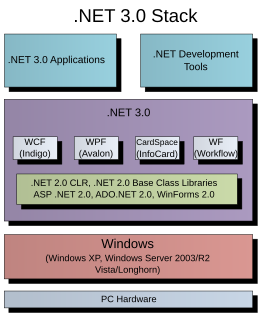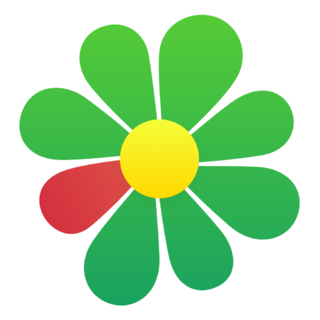
ICQ is a cross-platform instant messaging and VoIP client. The name ICQ derives from the English phrase "I Seek You". Originally developed by Mirabilis in 1996, the client was bought by AOL in 1998, and then by Mail.Ru Group in 2010.

Instant messaging (IM) technology is a type of online chat that offers real-time text transmission over the Internet. A LAN messenger operates in a similar way over a local area network. Short messages are typically transmitted between two parties, when each user chooses to complete a thought and select "send". Some IM applications can use push technology to provide real-time text, which transmits messages character by character, as they are composed. More advanced instant messaging can add file transfer, clickable hyperlinks, Voice over IP, or video chat.
Trillian is a proprietary multiprotocol instant messaging application created by Cerulean Studios. It is currently available for Microsoft Windows, Mac OS X, Linux, Android, iOS, BlackBerry OS, and the Web. It can connect to multiple IM services, such as AIM, Bonjour, Facebook Messenger, Google Talk (Hangouts), ICQ, IRC, XMPP (Jabber), VZ, and Yahoo! Messenger networks; as well as social networking sites, such as Facebook, Foursquare, LinkedIn, and Twitter; and email services, such as POP3 and IMAP.
Messenger was an instant messaging and presence system developed by Microsoft in 1999 for use with its MSN Messenger software. It was used by instant messaging clients including Windows 8, Windows Live Messenger, Microsoft Messenger for Mac, Outlook.com and Xbox Live. Third-party clients also connected to the service. It communicated using the Microsoft Notification Protocol, a proprietary instant messaging protocol. The service allowed anyone with a Microsoft account to sign in and communicate in real time with other people who were signed in as well.
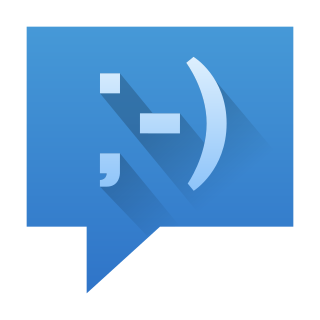
Kopete is a multi-protocol, free software instant messaging client released as part of the KDE Software Compilation. Although it can run in numerous environments, it was designed for and integrates with the KDE Plasma Workspaces. Kopete was started because ICQ blocked Licq from their network in 2001. According to the original author, Duncan Mac-Vicar Prett, the name comes from the Chilean Spanish word copete, meaning "a drink with your friends". Kopete has been nominated for multiple awards. The designated successor is KDE Telepathy from the KDE RTCC Initiative.
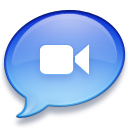
iChat is a discontinued instant messaging software application developed by Apple Inc. for use on its Mac OS X operating system. It supported instant text messaging over XMPP/Jingle or OSCAR (AIM) protocol, audio and video calling, and screen-sharing capabilities. It also allowed for local network discussion with users discovered through Bonjour protocols.

Miranda IM is an open-source multiprotocol instant messaging application, designed for Microsoft Windows. Miranda is free software distributed under the GNU General Public License.
The Yahoo! Messenger Protocol (YMSG) is the underlying network protocol used by the Yahoo! Messenger instant messaging client. Yahoo! Instant Messager supports many features beyond just messaging, including off-line messaging, file transfer, chat, conferencing, voice chat, webcams and avatars.
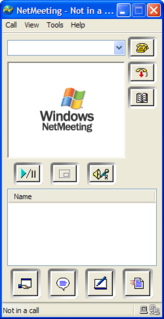
Microsoft NetMeeting is a discontinued VoIP and multi-point videoconferencing client included in many versions of Microsoft Windows. It uses the H.323 protocol for videoconferencing, and is interoperable with OpenH323-based clients such as Ekiga, OpenH323, and Internet Locator Service (ILS) as reflector. It also uses a slightly modified version of the T.120 Protocol for whiteboarding, application sharing, and file transfers.

Skype for Business Server is real-time communications server software that provides the infrastructure for enterprise instant messaging, presence, VoIP, ad hoc and structured conferences and PSTN connectivity through a third-party gateway or SIP trunk. These features are available within an organization, between organizations and with external users on the public internet or standard phones.
Microsoft Notification Protocol is an instant messaging protocol developed by Microsoft for use by the Microsoft Messenger service and the instant messaging clients that connect to it, such as Skype since 2014, and the earlier Windows Live Messenger, MSN Messenger, Windows Messenger, and Microsoft Messenger for Mac. Third-party clients such as Pidgin and Trillian can also communicate using the protocol. MSNP was first used in a publicly available product with the first release of MSN Messenger in 1999.

eBuddy is a privately held Dutch software company that offers instant messaging services. As of 2011. eBuddy reported 100 million downloads. The company's flagship service is XMS, a proprietary cross-platform instant messaging service. After some changes of ownership, the company is now again owned by its original founders, Onno Bakker and Jan-Joost Rueb.

Windows Live Web Messenger was the browser-based version of Windows Live Messenger developed by Microsoft which allowed users to send instant messages online and in real-time with others using the Microsoft Messenger service from within a web browser. The service allowed users without administrative privileges on their computer, such as at a shared public computer, to chat with others on their Messenger contact list without having to install the Windows Live Messenger client.

MSN Messenger, later rebranded as Windows Live Messenger, was a cross-platform instant messaging client developed by Microsoft. It connected to the Microsoft Messenger service while also having compatibility with Yahoo! Messenger and Facebook Messenger. The client was first released as MSN Messenger Service on July 22, 1999, and was marketed under the MSN branding until 2005 when it was rebranded under Windows Live and has since been officially known by its present name, although its previous name was still used colloquially by most of its users. In June 2009, Microsoft reported the service attracted over 330 million active users each month, placing Messenger among the most widely used instant messaging clients in the world.
A federation is a group of computing or network providers agreeing upon standards of operation in a collective fashion.

aMSN is a free Windows Live Messenger clone. aMSN attempts to emulate the look and feel of Windows Live Messenger, and supports many of its features. It has been downloaded approximately 40 million times as of January 2011, making it the 21st most downloaded project on SourceForge.

SHAPE.AG is a cross-platform independent software vendor and web-based services provider. The company develops instant messaging, social networking, productivity, entertainment, games, media and location-based applications for Apple iPhone, iPod Touch and iPad, BlackBerry, Windows Phone/Windows Mobile, Android, Symbian S60, UIQ, J2ME, and HP/Palm webOS mobile platforms.

Eyeball Chat is a proprietary freeware VoIP, video telephony soft phone with multiple-protocol instant messaging for Windows PCs, produced by Eyeball Networks in Vancouver, and first released in 2000. The software is free for personal use.

uTalk is a free client for messaging between phones and computers. With uTalk you can send free pictures, voice and text to your friends from any social network, chat in groups, and view your friends locations. uTalk supports various protocols such as AIM, Yahoo! Messenger, Windows Live Messenger, XMPP/Jabber, Vkontakte, Odnoklassniki, Google Talk, Gadu-Gadu, ICQ, MobileMe/iChat and Facebook.
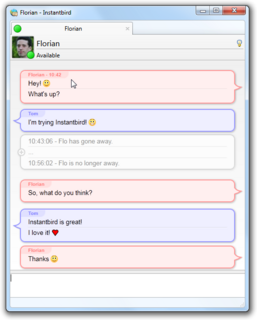
Instantbird is a cross-platform instant messaging client based on Mozilla's XULRunner and the open-source library libpurple used in Pidgin. Instantbird is free software available under the GNU General Public License. Over 250 add-ons allow user customization of, and addition of, features. On October 18, 2017 Florian Quèze announced that "... we are stopping development of Instantbird as a standalone product."


